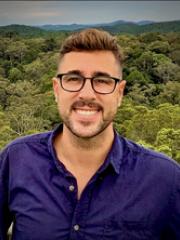Dr Matthew Luskin

Researcher biography
Matthew heads the Ecological Cascades Lab [link] in the UQ School of the Environment, is a Chief Investigator with the UQ Centre for Biodiversity and Conservation Science, is the Director of the TERN Wildlife Observatory of Australia, and is an ARC DECRA Fellow from 2022-2025.
We are accepting qualified PhD students for domestic and international wildlife projects. Potential PhD topics include: How does the loss of apex predators influence lower trophic levels? How does selective hunting of particular species (e.g. pigs) affect non-hunted competitors (e.g. deer)? How does wildlife influence plant communities and traits? How do invasive predators affect biodiversity? How can we integrate existing camera trap datasets to conduct powerful analyses and for monitoring? How will climate change impact the phenology of trees and thus fruit resources for animals?
Our lab is interested in all aspects of wildlife ecology, including food-web ecology, plant-animal interactions, and applied conservation science. We have experience with tropical forests in Southeast Asia using a variety of flora and fauna sampling techniques (cameras, vegetation surveys, fenced animal exclosures, invasive species, hunting surveys, and before-after zoonotic disease). We also run the largest camera trapping surveys across the Wet Tropics forests of Queensland. Most sampling is geared to assess the impacts of habitat fragmentation, agriculture, hunting, climate change, and invasive species on wildlife communities and plant-animal interactions.
Prior to joining UQ, Matthew worked with the Smithsonian Institute's Forest Global Earth Observatory (ForestGEO) to coordinate surveys of wildlife communities in Sumatra, Borneo, Peninsular Malaysia, Thailand, and Singapore. These projects link apex predators to herbivores to trees and have revealed how oil palm expansion has restructured ecological communities and triggered trophic cascades. Matthew has now begun a large long-term project in the Dja Faunal Reserve of Cameroon with the Congo Basin Institute and collaborates closely with UCLA on these projects. Matthew obtained his PhD in Environmental Science, Policy and Management from the University of California, Berkeley.
